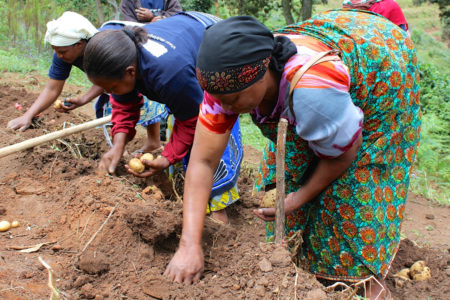As millions of small-scale farmers struggle with the effects of climate change, scientists at the International Potato Center (CIP) are using wild potatoes to develop climate-resilient varieties. The resulting potatoes combine heat and drought tolerance with resistance to the most important diseases affecting potato crops, late blight and bacterial wilt, which are expected to become greater threats as global warming advances.

Globally, late blight alone causes billions of dollars in losses for potato farmers, who spend more than USD 1 billion per year on fungicides to control the disease. The development of disease resistant potato varieties can substantially reduce production costs and help improve the incomes and diets of small-scale potato farmers.
Scientists spent the past four years evaluating wild – often inedible – potatoes stored at CIP’s genebank in Lima, Peru, and crossing them with cultivated potatoes, with support from the Crop Trust and the Government of Norway. The CIP genebank safeguards one of the world’s largest collections of the potato’s wild relatives, some of which grow in areas with harsh climates or pest and disease pressure. Those plants evolved mechanisms to cope with extreme conditions, and breeders want to transfer those traits into cultivated varieties.
Because crop wild relatives are very different from cultivated species, using them for crop improvement requires a laborious pre-breeding process. A second phase of Crop Trust support will allow CIP scientists to continue pre-breeding for two more years while sharing potato clones that contain resistance genes from wild relatives with other crop improvement programs.
“We will share our climate-resilient potatoes with breeding programs in Kenya, Peru and worldwide for crossing with locally adapted potatoes. We will also provide our partners with training in the evaluation, selection and use of crop wild relatives in potato breeding while raising awareness of their potential globally,” said CIP potato breeder and project leader Dr. Thiago Mendes.
As the crossbred potatoes developed in phase one may not possess all the characteristics that consumers and farmers want, CIP and partners will work with smallholder farmers in Peru and Kenya to evaluate them and select the best ones. Kenya and Peru are excellent places to introduce climate-resilient potatoes, since potato provides livelihood and employment opportunities to more than three million people in the two countries.

“Bacterial wilt and late blight already cause significant economic losses, particularly to small-scale farmers in Africa, and they are expected to become more of a problem as a result of climate change,” Mendes said. “Small-scale farmers can’t always afford the fungicides needed to control late blight disease, which means they suffer most. And because the late blight pathogen is evolving rapidly, the effectiveness of fungicides diminishes over time. Crop wild relatives represent a new, valuable source of resistance.”
“Crop wild relatives are a largely untapped resource for crop breeders to adapt our most important crops to climate change,” said Dr. Benjamin Kilian, of the Crop Trust. “We are excited to help CIP use them to improve potato, a vital global staple.”
This work is part of the initiative “Adapting Agriculture to Climate Change: Collecting, Protecting and Preparing Crop Wild Relatives” which is supported by the Government of Norway. The project is managed by the Global Crop Diversity Trust with the Millennium Seed Bank of the Royal Botanic Gardens, Kew UK and implemented in partnership with national and international genebanks and plant breeding institutes around the world. For further information, visit the project website: http://www.cwrdiversity.org/
About the International Potato Center (CIP)
Headquartered in Lima, CIP was founded in 1971 as a root and tuber research-for-development institution delivering sustainable solutions to the pressing world problems of hunger, poverty and the degradation of natural resources. CIP is custodian to a collection of potato, sweetpotato and Andean roots and tubers including the world’s largest collection of potato diversity. CIP has regional offices in Ecuador, Kenya, India and China and projects in more than 20 developing countries across Asia, Africa and Latin America. www.cipotato.org
CIP is a CGIAR research center, part of global partnership for a food-secure future. CGIAR science is dedicated to reducing poverty, enhancing food and nutrition security, and improving natural resources and ecosystem services. Its research is carried out by 15 CGIAR centers, in close collaboration with hundreds of partners, including national and regional research institutes, civil society organizations, academia, development organizations and the private sector. www.cgiar.org
About the Global Crop Diversity Trust
The Crop Trust is an international organisation working to support conservation and use of plant genetic resources. It supports international genebanks, national genebanks, the world’s back up facility, the Svalbard Global Seed Vault and pre-breeding activities around the world. The Crop Trust allocates funds to support genebanks through the Crop Diversity Endowment Fund – a self-sustaining fund that generates investment income to support crop conservation. The Crop Trust is recognised as an essential element of the funding strategy of the International Treaty on Plant Genetic Resources for Food and Agriculture. www.croptrust.org
Contact
| María Elena Lanatta International Potato Center Cel. 981187198 m.lanatta@cgiar.org |
